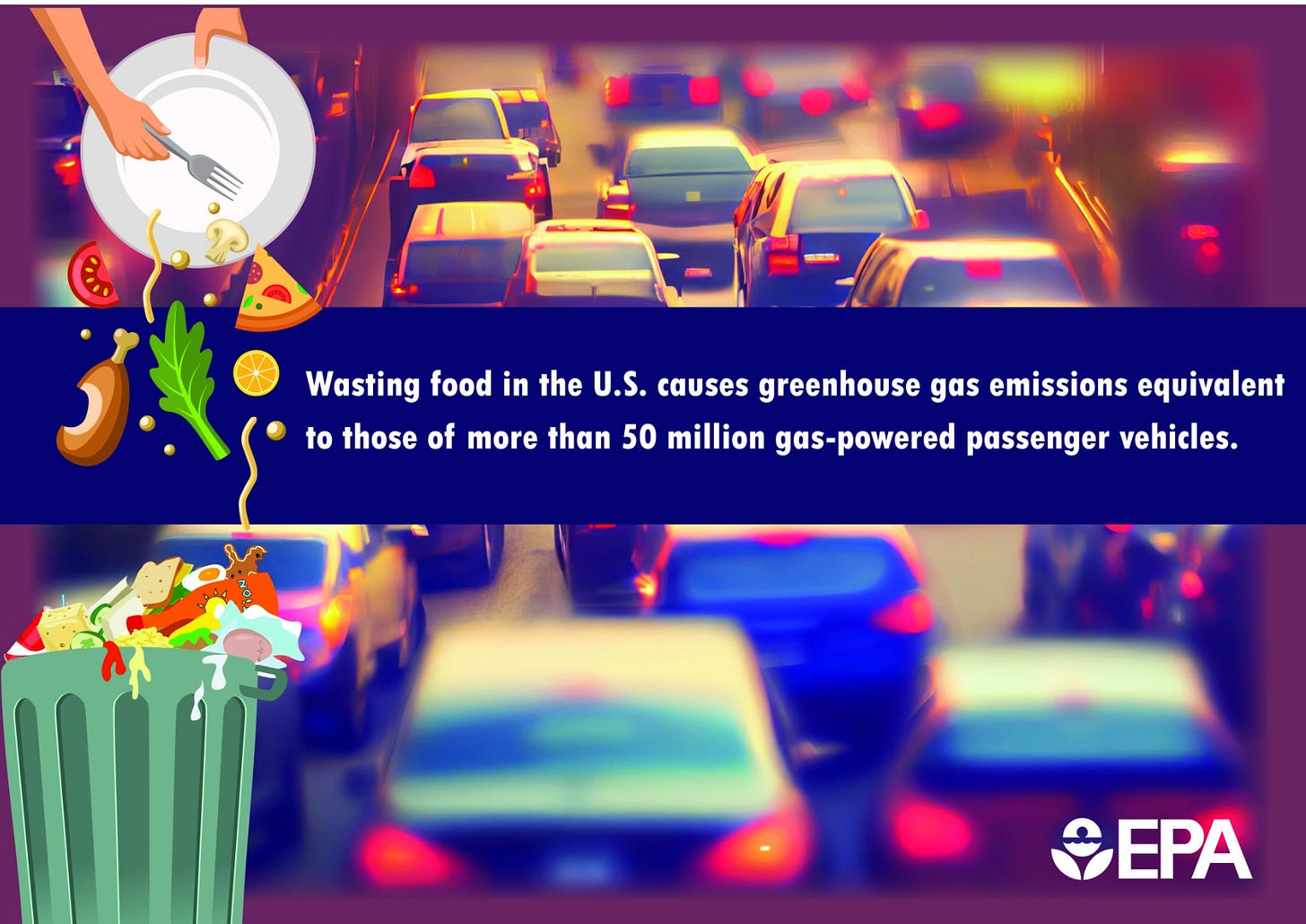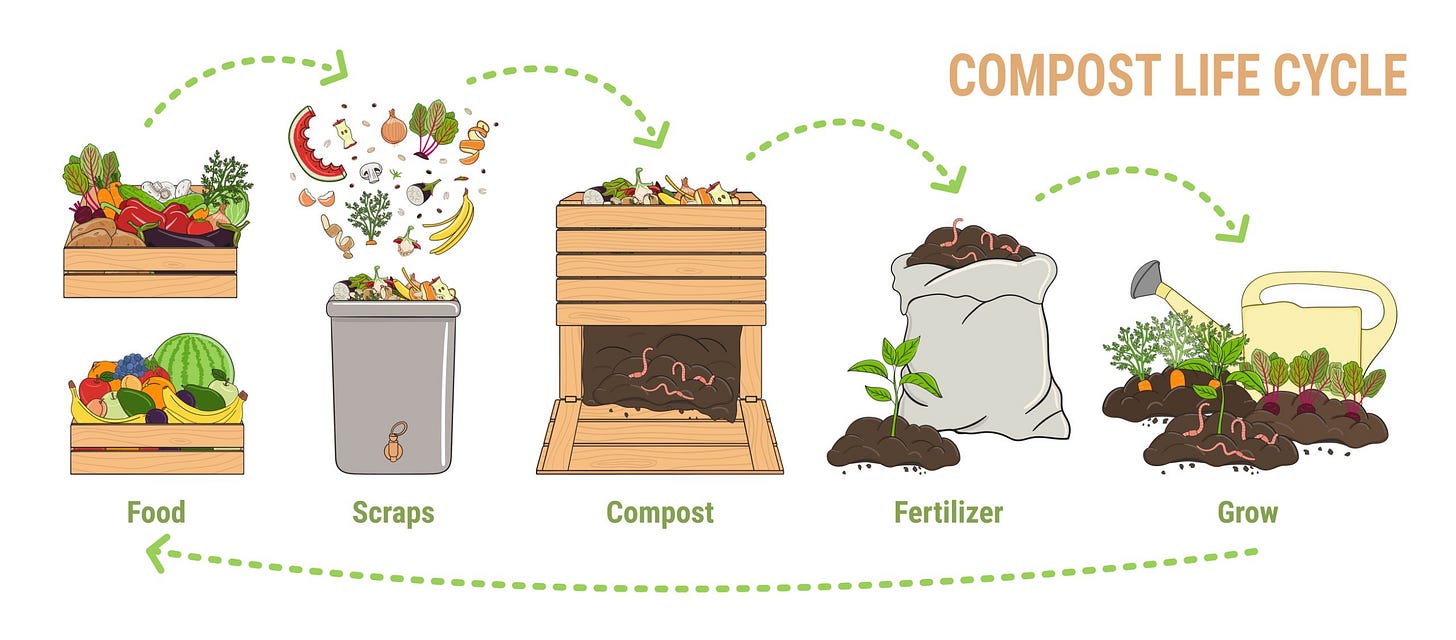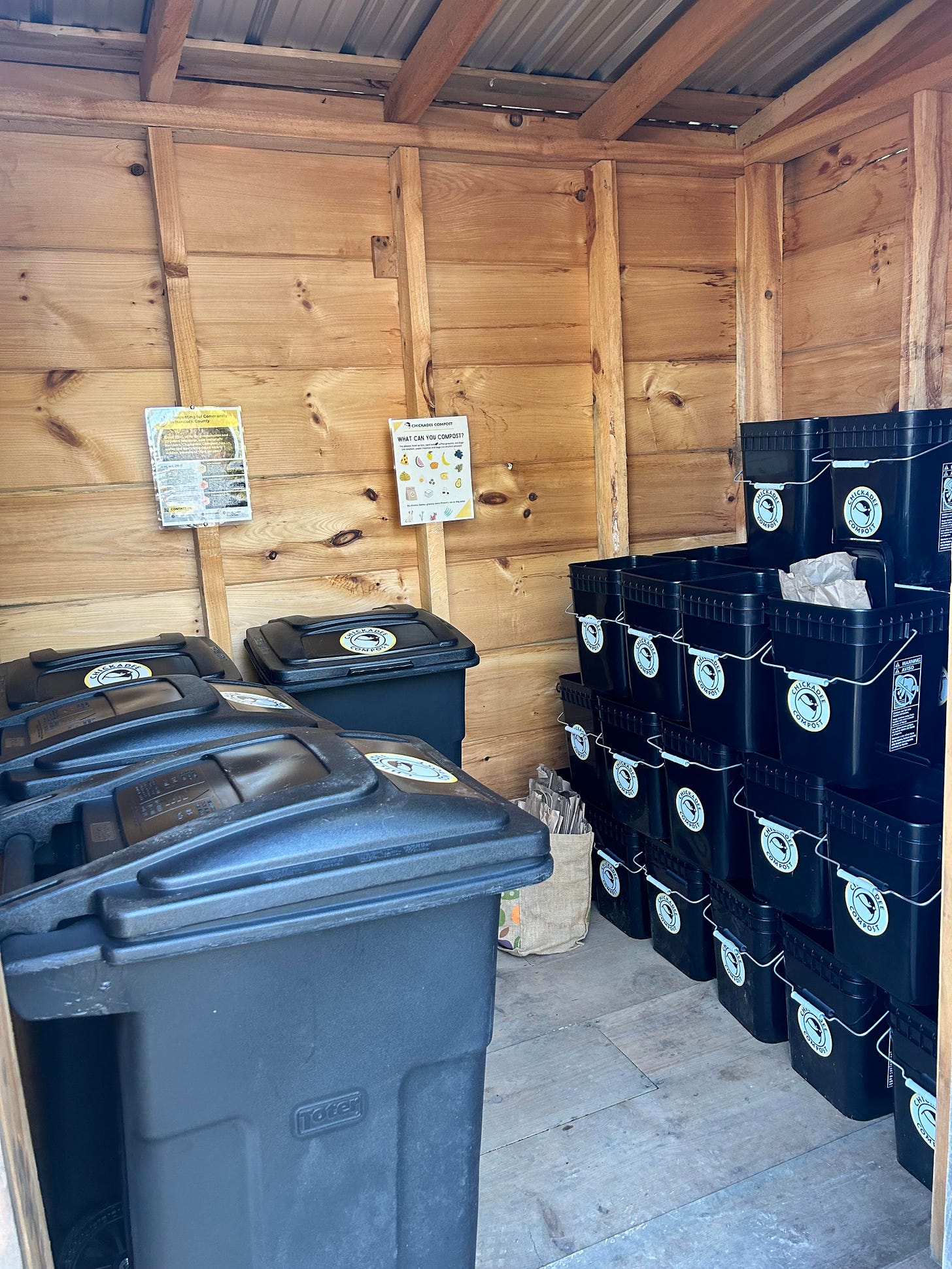Wasted Food: Going After a Massive Problem One Compost Bin at a Time
Food Waste Impacts Towns' Budgets and Air
BAR HARBOR—Food scraps. Yard waste. Combined, the items are about 40 percent of what Maine homes throw away.
Those scraps, those twigs, the random lettuce that wilts and isn’t eaten, the moldy bread or cheese? It adds up and many local people and groups are trying to find ways to reduce the amount of organic garbage that goes into the waste stream.
One of those organizations is the Bar Harbor Garden Club, which has a new composting pilot program.
Every year, it’s estimated that Americans throw away approximately 452 pounds of organic garbage. That’s garbage that could be composted. It’s also garbage that creates methane, a greenhouse gas, when it’s in a landfill.
Approximately 40 percent of Maine’s solid waste is organics, according to a May 2024 Maine Department of Environmental protection study.
“Overall, this study estimates food loss and waste in Maine to be approximately 361,506 tons per year across all sectors (271,036 tons per year, excluding farms),” the study states. “This approach is based on identifying applicable generation factors and applying them to data specific to Maine.”
The same study estimates that Hancock County produces 22,260 tons of food loss and waste annually.
Most of that waste comes from our homes, then our farms, the study says.
THE WORRIES AND THE GLEANING EFFORT
In a world of food insecurity, some Hancock County groups, nonprofits, and fourth graders have found the food-waste stream troublesome on multiple levels. One of those levels is keeping kids healthy when so much food is being thrown away.
According to Feeding America and Healthy Acadia’s Downeast Gleaning Initiative, in Hancock County, approximately 1 in 6 children do not have access to enough “healthy, nutritious food to support an active, healthy life.”
Healthy Acadia coordinates farm-based opportunities for gleaning. Volunteers collect surplus vegetables and fruits and distributes them to pantries, community meal organizations like Open Table, school backpack programs, and others.
Downeast Farm Drop wrote Monday that “preventing food waste is an essential element of FarmDrop's mission to build a more sustainable food system. Approximately 16% of all US food waste occurs on farms. Even though farmers want everything they grow to end up on a plate, food is often not sent to market due to strict cosmetic specifications from buyers, high costs to growers to return to the fields, and poor coordination between the two groups. Gleaning, the process of gathering food that has been left behind in the fields or markets, brings vegetables to food pantries and ensures as much food is harvested as possible.”
But even with gleaning efforts from farms, there is still waste, much of it from homes.
A recent report by Anna Phillips of the Washington Post states, “Nine states have passed food waste bans aimed at businesses such as chain restaurants and supermarkets. Researchers studied the first five laws and found that from 2014 to 2018, Massachusetts reduced its solid waste by an average of 7.3 percent. But similar legislation in the other states — California, Connecticut, Rhode Island and Vermont — had no discernible effect. States with newer laws were not included in the study because they did not have sufficient data.”
The Environmental Protection Agency released a study that stated that the emissions from the nation’s food waste is equal to approximately 50 million cars driving on roads.
LOCAL IMPACT
All that food waste costs communities money to ship the waste to the landfill rather than composting it at home or by an organization such as Chickadee Compost, a Surry-based company.
In just under three hours, a June 2022 waste audit in Bar Harbor collected waste from each of five categories: residential, restaurant, municipal, commercial, and weekly rentals. The audit just represents the trash that came in on that one day from people who consented to having their trash sorted, but it showed that of the 753.95 pounds of waste sorted, 28.87% was food waste (217.7 lbs).
One of the reasons for Massachusetts success—the sole success of any state in reducing food waste in landfills—Phillips wrote is “the state had built the most extensive network of food-waste-composting sites, making it relatively simple and affordable for businesses to divert food from landfills and incinerators. Massachusetts’ law had no special exemptions and was easy for business owners to understand. Massachusetts also increased the cost of not following the rules and had conducted the most compliance checks.”
IN COMES THE BAR HARBOR GARDEN CLUB
In Bar Harbor, the waste disposal contract is with MRC, the Municipal Review Committee (MRC), which is based in Orono. The town’s trash heads to Juniper Ridge in Old Town. Composting, organized by the town or at any of the town sites, is limited by the town’s multi-year contract with MRC.
Town Manager James Smith said, “We are exploring composting options. Location and available space are important considerations and there are some contractual constraints with the MRC that must be considered. Also, I'm sure you're aware composting is regulated by the State of Maine, so we will need to adhere to those requirements.”
The town is also looking into holistic within the legal limits of what its contracts, said Public Works Director Bethany Leavitt. Individuals and businesses and non-profits, can and do, compost.
The Bar Harbor Garden Club has recently found a site at the Stone Barn to run a pilot program that will allow subscribers to send food waste to Chickadee Composting in Surry.
“By composting wasted food and other organics, we can decrease our community’s carbon footprint and reduce solid waste brought to landfills,” the garden club site says. In a press release, it adds, “By taking part in this project, you will reduce the solid waste brought to landfills, the tipping fees associated with disposal and the community’s carbon footprint.”
“About 530,000 tons of food and 45 million gallons of milk is wasted in U.S. school cafeterias each year, the World Wildlife Fund estimates, which translates into about $1.7 billion worth of uneaten food,” according to Inverse.com.
That’s a problem, the Conners Emerson fourth graders said when they were presenting to the Bar Harbor School Board in June. It’s a problem because food waste releases methane.
“Methane,” one fourth-grader explained, “is bad for the earth because it’s able to trap heat in the atmosphere.”
A greenhouse gas, methane traps 28 times more heat in the Earth’s atmosphere than carbon dioxide.

DOING SOMETHING ABOUT IT IN LOTS OF WAYS
The Bar Harbor Garden Club, Healthy Acadia, town sustainability and climate committees, and organizations like a Climate to Thrive and even the Mount Desert Historical Society aren’t the only groups thinking about food waste, carbon, methane, and climates.
One fourth grade class at Conners Emerson wanted to reduce the waste and also to compost what wasn’t used and met with the school board, principal, and superintendent to tell them they’d like to be part of change when it comes to food waste at the K-8 school.
A World Wildlife Fund (WWF) study estimates that food waste in the nation’s schools (not including milk) could be up to 530,000 tons annual. Schools that were a part of the organization’s pilot program reduced that output by 10%.
“Nationally, an average of 76% of food waste goes to landfills, which could translate into 402,800 tons of food waste from schools per year,” the WWF states. “In terms of greenhouse gas emissions, the combined impact of sending school food waste to landfills is like adding about 46,100 additional passenger vehicles to the road for one year.”
At a meeting hosted by the Mount Desert Historical Society earlier this spring, Bar Harbor Task Force on the Climate Emergency Chair Ezra Sassaman said, “Waste is a big issue that we've been talking about recently because the town of Bar Harbor realized that a huge expense for the town is just how much waste we've been producing and sending to landfills.
“That's costing a ton, a lot, of money. So food waste, instead of just going to a landfill, can get sent to farms and gardens and reusable materials can be repaired and repurposed instead of also going to landfills.”
Bar Harbor’s entire solid waste department budget expenses are $1,222,450.
The town’s 2022-23 budget allocated $614,000 for the disposal of approximately 10 million pounds of trash and recycling. A study, expected to be completed in three months, will look into ways to potentially alleviate some of the costs of solid waste for the Bar Harbor taxpayer.
Currently, the College of the Atlantic has a Discarded Resource and Material Management Policy that students developed in the college’s Zero Waste Club. The approved plan is working for a “90% diversion of discarded materials campus-wide by 2025.”
THE COMPOST PILOT PROGRAM
The Bar Harbor Garden Club’s pilot program about composting food waste began September 10. It comes after a year of work to create the project. The project hopes for 50 subscribers and will re-evaluate the program’s feasibility after a year.
“With funding from proceeds from the 2023 Garden Tour, we are partnering with Chickadee Compost and Maine Coast Heritage Trust to deliver a one-year pilot to compost household food waste on MDI. We are inviting BHGC members, friends, family as well as the public to participate as subscribers in this pilot,” the site says.
Bar Harbor’s Task Force on the Climate Emergency has also been looking to help reduce the town’s waste stream and carbon footprint.
Free Four Gallon Bucket
In the garden club’s program, fifty people who subscribe will receive a free four-gallon bucket. This bucket will hold household food scraps.
A brown paper bag in the bucket will keep it clean. Bioplastic bucket liners are not approved by Maine Organic Farmer Association (MOFA). The association provides Chickadee Compost its organic certification
What Can You Compost?
All food. That includes dairy, shellfish, meat, and small bones. It doesn’t include stickers, packaging, twist ties or rubber bands.
Paper napkins and paper towels are fine.
Lint, glass, plastic, metal, bioplastic, rubber are not.
How it works, how to join and cost
Subscribers have a passcode and unlock the shed which is located at the MCHT Stone Barn Preserve for dog walking and hiking.
Chickadee Compost, which holds a state license for community composting will pick up the scraps at the shed and bring to a Surry facility.
Subscribers will pay a $10 monthly or $120 annually subscriber fee via the MDI Food Waste Compost Pilot link on the BHGC website which connects directly to the Chickadee Compost signup form. This is a reduction of the normal cost of $15 a month.
Climate Emergency Task Force Wants You
The Task Force on the Climate Emergency in Bar Harbor meets every second and fourth Monday from 4:00 p.m. to 5:30 p.m. in the Municipal Building.
It’s looking for more members. According to the town’s website, there are currently four vacant seats. Applications can be found on the Town’s website at barharbormaine.gov.
The mission of the Climate Emergency Task Force is to define and recommend climate goals with the objective of drawing down carbon from the atmosphere and reducing community-wide greenhouse gas emissions by 2030.
Last week, Bar Harbor announced that for the first time ever, 100% of its electricity needs will be supplied from green energy sources. Historically, the town has received only 60% of its electricity supply from green energy sources.
Under a new one-year contract with Competitive Energy Services, Inc. Bar Harbor will see a modest savings of $11,800 annually compared with its current electricity supply costs, while also ensuring that it is moving the town toward meeting its climate action goals.
LINKS AND REFERENCES
To subscribe and learn more about the garden club’s program
FOOD LOSS AND WASTE GENERATION STUDY Maine Department of Environmental Protection
WWF Food Waste Warrior Deep Dive Report 2019
https://www.epa.gov/sustainable-management-food/wasted-food-scale
One of our past stories about the waste stream
NATIONAL RESOURCES COUNCIL OF MAINE-PLASTIC POLLUTION
Read about the College of the Atlantic’s zero-waste efforts here.
Bar Harbor’s Solid Waste and Recycling Division is here.
Bar Harbor Climate Action Plan November 2021
Working Documents for the Bar Harbor task force
NATIONAL RESOURCES COUNCIL OF MAINE-PLASTIC POLLUTION
Read about the College of the Atlantic’s zero-waste efforts here.
Bar Harbor’s Solid Waste and Recycling Division is here.
If you’d like to donate to help support us, you can, but no pressure! Just click here.
If you’d like to sponsor the Bar Harbor Story, you can! Learn more here.


















